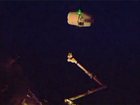A SpaceX Dragon capsule is back on Earth with a full load of cargo, after a quick trip home from the International Space Station.
The capsule, containing more than 3,000 pounds (1,360 kilograms) of experiments and equipment, splashed into the Pacific just off the Southern California coast Thursday less than six hours following its station departure.
 Full Story
Full Story
A world of diversity has been discovered in plankton, the tiny plants, viruses and embryonic fish that are a favorite food of whales and supply much of the planet's oxygen, researchers said Thursday.
Plankton are important because they serve as the base of the marine food chain and provide half the oxygen generated on Earth by photosynthesis.
 Full Story
Full Story
A popular webcam showing large male Pacific walruses lying on the beach with a Hitchcockian number of seabirds flying overhead is once again streaming to the Internet.
The high-definition stream from Alaska's remote Round Island had been dormant for nearly a decade after private funding ran out, but a version is back now, thanks to a philanthropic organization that operates a series of nature webcams from around the planet. The walrus cam, part of the Pearls of the Planet series, can be viewed at: http://explore.org/live-cams/player/walrus-cam-round-island.
 Full Story
Full Story
Anthropologists said Wednesday that stone tools found in northwest Kenya dating back 3.3 million years challenge the mainstream story of mankind.
The tools are an astonishing 700,000 years older than the first known implements, which have been attributed to Homo habilis, a forerunner of modern humans.
 Full Story
Full Story
Scientists say they've discovered Washington state's first dinosaur fossil, an announcement that marks a unique find for the state and a rare moment for North America's Pacific coast.
Paleontologists at Seattle's Burke Museum said Wednesday that the 80 million-year-old bone fragment probably belonged to an older, smaller cousin of the Tyrannosaurus rex.
 Full Story
Full Story
The governor of California declared an emergency as crews scrambled to contain an oil slick and clean up popular beaches after a pipeline rupture dumped thousands of gallons of oil into the ocean.
A day after the spill near Santa Barbara, northwest of Los Angeles, the U.S. Coast Guard said helicopter overflights had shown the slick stretched some nine miles (14 kilometers) along the Pacific Ocean coast.
 Full Story
Full Story
The U.S. Air Force launched its robotic space plane into orbit for a fourth flight on Wednesday aboard an Atlas 5 rocket, in a mission aimed at testing a new engine to steer satellites, officials said.
The rocket carrying the X-37B successfully lifted off from Cape Canaveral, Florida and officials said the scheduled return of the unmanned plane had yet to be determined.
 Full Story
Full Story
Japan's zoos and aquariums were expected to decide Wednesday whether to remain part of a global body that suspended them over their use of dolphins caught by the controversial drive hunt method.
Last month, the World Association of Zoos and Aquariums (WAZA) voted to suspend its Japanese chapter (JAZA), saying it had refused to stop taking dolphins caught in Taiji in southern Japan.
 Full Story
Full Story
Elite athletes are blessed with an area of the brain that performs 82 percent faster than average under intense pressure, a study published on Wednesday claims.
A series of tests commissioned by Dunlop Tyres in conjunction with University College London (UCL) found that extreme sportsmen and women performed significantly better under physical and mental duress than members of the public.
 Full Story
Full Story
When Japanese researchers said earlier this year that eating whale meat could help prevent dementia and memory loss, the news provoked snorts of derision -- it couldn't be real science, went the retort.
Despite protestations of academic rigour from the men and women who do the work, anything involving the words "Japan", "whaling" and "research" suffers from a credibility gap in the court of global public opinion.
 Full Story
Full Story



